

Can the internet be saved without harming democracy? Citizens of the internet: here is some welcome news.
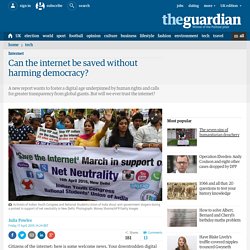
Your downtrodden digital rights might be getting a well-overdue booster shot. But it comes with some warnings. This week in the Hague, a high-level group of 29 internet policymakers and influencers – including prominent ex-US and UK security and intelligence officials Michael Chertoff, Joseph Nye, Melissa Hathaway and David Omand – issued a clarion call for the protection and promotion of human rights online. Self-styled the Global Commission on Internet Governance, the group made this call as part of the broader objective of restoring trust and confidence in the internet. This clear and unambiguous statement is a mature recognition of both the environmental and legal reality: if we weaken security, even for the ostensibly “good” guys, we leave communications wide open for the bad guys, too. A new normative framework underpinned by human rights.
Smart citizens. How internet facilitates smart choices in city life. Citation: Work data: Type of work: Report Categories: ICT Infrastructure | Participation & Uses.
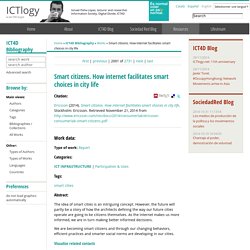
Internet Freedom Day: This Year We Go to War for Net Neutrality. Image: DrAfter123/Getty The loss of net neutrality this week was even bigger than expected.
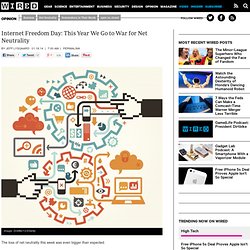
Copyright Week launched to fight “biggest threat to the Internet you’ve never heard of” An Internet for the Common Good: Engagement, Empowerment and Justice for All. This document was prepared by a group of Community Informatics activists and endorsed by consensus of the Community Informatics community 21.12.13.
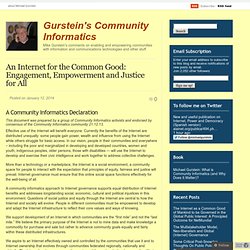
So What Do We Do Now? Living in a Post-Snowden World. As the avalanche of Snowden revelations resumes after it’s brief organizational regrouping and holiday hiatus a few learnings and even more direct and pertinent questions are starting to emerge.
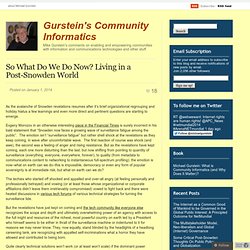
Evgeny Morozov in an otherwise interesting piece in the Financial Times is surely incorrect in his bald statement that “Snowden now faces a growing wave of surveillance fatigue among the public”. The emotion isn’t “surveillance fatigue” but rather shell shock at the revelations as they keep coming, in wave after uncomfortable wave. The first reaction of course was shock (and awe), the second was a feeling of anger and rising resistance. Quite clearly technical solutions won’t work (or at least won’t scale) if the dominant power doesn’t want them to work, and anyway who would trust that anti-surveillance solutions were working after all we know of how the corporate sector and the tech community has been (willingly or or no) brought in as semi-aware co-conspirators. Italy passes Internet censorship laws: regulator can censor sites on 12 days' notice without judicial review.
Mikko Hypponen: How the NSA betrayed the world's trust. Video: Who Controls the Internet? Bill Gates: Prioritizing Worldwide Internet Access Over Malaria Research Is A 'Joke' Technology is "amazing," Bill Gates told the Financial Times in a recent interview, but it's not going to save the world.
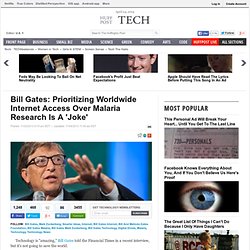
Speaking with the Times' Richard Waters about what it's going to take the make the planet a better place, the Microsoft co-founder said that though improvements in technology may have their benefits, they won't meet the needs of the world's most desperate. The Internet isn’t as open as it used to be. The Internet isn’t the outlet of freedom and prosperity it used to be.
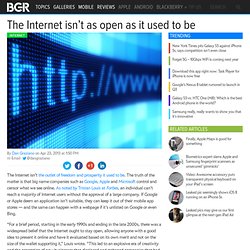
The truth of the matter is that big name companies such as Google, Apple and Microsoft control and censor what we see online. As noted by Tristan Louis at Forbes, an individual can’t reach a majority of Internet users without the approval of a large company. If Google or Apple deem an application isn’t suitable, they can keep it out of their mobile app stores — and the same can happen with a webpage if it’s unlisted on Google or even Bing. Internet emits 830 million tonnes of carbon dioxide.
MELBOURNE: Internet and other components of information communication and technology (ICT) industry annually produces more than 830 million tonnes of carbon dioxide (CO2), the main greenhouse gas, and is expected to double by 2020, a new study has found.

Researchers from the Centre for Energy-Efficient Telecommunications (CEET) and Bell Labs explain that the information communications and technology (ICT) industry, which delivers Internet, video, voice and other cloud services, produces about 2 per cent of global CO2 emissions -- the same proportion as the aviation industry produces. In the report published in journal Environmental Science & Technology, researchers said their projections suggest that ICT sector's share in greenhouse gas emission is expected to double by 2020.
They have also found new models of emissions and energy consumption that could help reduce their carbon footprint. Could It Happen In Your Country? {Updated; see below for lists of countries for easier reference, and a special offer for WCIT attendees.
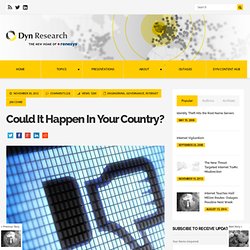
—jim} Francesca Kaplan Grossman: Real Innovation in Education Is About the Internet. We are the first people to admit that when it comes to the digital age, we've been under a rock.
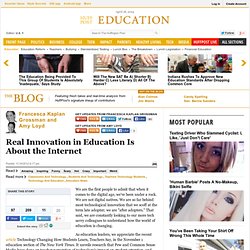
We are not digital natives. We are so far behind most technological innovation that we scoff at the term late adopter; we are "after adopters. " That said, we are constantly looking to our more tech savvy colleagues to understand how the world of education is changing. As education leaders, we appreciate the recent article Technology Changing How Students Learn, Teachers Say, in the November 1 education section of The New York Times. It unveils research that Pew and Common Sense Media have done on teacher perception of technology's impact on student attention, and that many teachers believe it is now more difficult to teach children using traditional methods.
Education is part of a bigger movement, across all of society, towards "connected solutions" to our hard problems. Register for the Geneva E-diplomacy Day (16 November 2012) Remote Participation 2012. The Internet Association Announces Membership and Policy Platform. The unified voice of the Internet economy in Washington formally launches. WASHINGTON, D.C. – The Internet Association, the nation’s first trade association representing the interests of the Internet economy, America’s leading Internet companies and their vast community of users, today unveiled its full membership roster and policy platform.
The Internet Association, led by President and CEO Michael Beckerman, comprises 14 diverse Internet companies that form the backbone of the Internet economy. The member companies – Amazon.com, AOL, eBay, Expedia, Facebook, Google, IAC, LinkedIn, Monster Worldwide, Rackspace, salesforce.com, TripAdvisor, Yahoo! , and Zynga – have joined forces to form The Internet Association, an umbrella public policy organization dedicated to strengthening and protecting a free and innovative Internet. “A free and innovative Internet is vital to our nation’s economic growth,” said Michael Beckerman, President and CEO of The Internet Association.
World Wide Web Foundation. Universidad de Palermo. It is well known that laws do not operate in a vacuum, but rather in a complex system of institutions, rules, and various actors. While principles and standards are key to promoting improved legislation, special consideration of context is also vital for ensuring the implementation of laws. Access to information is not a stranger to this idea. IG-EurostatDigitalInclusion_WeAreWhatWeDo_DEF.pdf. Open letter to Hillary Clinton on Internet freedom. Last month I wrote an open letter to Hillary Clinton. It was based on a presentation I that I made during a panel discussion at a Google sponsored conference titled Internet at Liberty 2012 in Washington DC on May 24, 2012. Sunil Abraham's article was published in Thinking Aloud on July 17, 2012 The question that my panel tried to grapple with was "In a world where nearly nine out of ten Internet users are not American, what is the responsibility of United States institutions in promoting internet freedom?
" Digital Agenda: New strategy for safer internet and better internet content for children and teenagers. European Commission - Press release Digital Agenda: New strategy for safer internet and better internet content for children and teenagers Brussels, 2 May 2012 –The Commission has set out a plan to give children the digital skills and tools they need to benefit fully and safely from the digital world. The internet was not designed with children in mind, but today 75% of children use the internet, a third of them on mobiles.
The new strategy is to build up the market for interactive, creative and educational content online, in a partnership between the European Commission and Member States, mobile phone operators, handset manufacturers and providers of social networking services. European Commission Vice President Neelie Kroes said: " I support getting every kid connected. Art in the Era of the Internet (and Why Open Education Matters) Internet users (per 100 people) Global INET. How to use Twitter, Facebook, blogs and more for neighbourhood planning. February 20, 2012 Author: Hannah If used well, social media can be a fantastic free tool for anyone running a community consultation or mobilising residents to take part in neighbourhood planning. While there’s no substitute for traditional methods of communication, such as door knocking, local meetings, posters and leaflets, Twitter, Facebook and blogs can help your campaign reach more people.
Here are five reasons why you should consider using social media for neighbourhood planning – and five golden rules to help you do it well. You can also download our in-depth Social media guidelines for neighbourhood planning for more detailed information about putting these into practice. If you’re collecting views from neighbours about the local area, social networking sites like Facebook are a good place to encourage debate – and perhaps reach those who are more comfortable using this technology than attending meetings.
Twitter is also a good tool to do this. {*style:<i> </i>*}